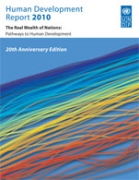/sub-categories/research-papers
Research Papers
Status of water supply, sanitation and solid waste management in urban areas – A research study by CPHEEO (2005)
Posted on 11 Nov, 2010 10:16 PMThis study by the Central Public Health and Environmental Engineering Organisation (CPHEEO) assesses the status of water supply, sanitation and solid waste management in selected 300 cities and towns of India including all metropolitan cities and selected Class I and Class II urban centres. It estimates the requirement of funds for full coverage of population by these services in the urban areas of the country from 1999 to 2022 (at five yearly intervals). Overall, the study confirms the normal notion that the metropolitan cities are better provided for than the other size class of urban centres.
Human development report 2010 - The real wealth of nations - United Nations Development Programme
Posted on 10 Nov, 2010 12:50 PMUnited Nations Development Programme (UNDP) has recently published the 20th Anniversary edition of its Human Development Report (HDR) which presents the latest Human Development Index (HDI). The premise of the HDI reports is simple - national development should be measured not simply by national income nor should an individual’s well-being be evaluated by money alone, as had long been the practice, but also by life expectancy and literacy.
Income is of course crucial - without resources, any progress is difficult. Yet there is a need to gauge whether people can lead long and healthy lives, whether they have the opportunity to be educated and whether they are free to use their knowledge and talents to shape their own destinies.
Gully control in semi arid tropical watersheds – A report by ICRISAT
Posted on 04 Nov, 2010 09:21 PMThis report prepared by ICRISAT under its Global Theme on Agroecosystems deals with the problem of gully erosion, which is common in the semi-arid region, characterized by denuded landscape and flash floods. An estimated 4 million ha land in India and 29 million ha of land in Africa are affected by severe gully erosion. Gully erosion is more difficult and expensive to control than other types of soil erosion.
The Indian Summer Monsoon - Past, Present and Future - A presentation
Posted on 03 Nov, 2010 02:56 PMThe history of the United Kingdom’s interest in the Indian monsoon is discussed as also the challenges of climate change for India. Some basic facts regarding the Indian socio-economic context are presented to underline the importance of rainfed agriculture and hence the dependence on monsoons.
Judicious management of groundwater through participatory hydrological monitoring – A manual by APWELL
Posted on 23 Oct, 2010 06:56 PMParticipatory hydrological monitoring improves the users’ understanding of local groundwater resource characteristics and helps local communities to form a community opinion to support appropriate measures for managing the available resources equitably.
Right to drinking water in India - A working paper by Centre for Economic and Social Studies
Posted on 21 Oct, 2010 10:31 PMThis working paper by Centre for Economic and Social Studies (CESS), Hyderabad deals with the issue of right to drinking water, an issue that has assumed greater significance in India in recent years. Declarations by the United Nations and other international organisations, and judic
Tank irrigation in semi-arid tropical India: Economic evaluation and alternatives for improvement - A report by ICRISAT
Posted on 20 Oct, 2010 10:03 PMThis report by ICRISAT deals with a survey of thirty-two tanks and farm data from Andhra Pradesh and Maharashtra states to assess the economic performance of irrigation tanks in semi arid tropics of India. It uses district-wise data on climatic and institutional variables to analyze the factors affecting tank-irrigation density. Results indicate that the spatial distribution of irrigation tanks is determined primarily by physical factors—hard rock substratum, post-monsoon rains, low moisture-holding capacity of soils and by population density.
Mitigating the potential unintended impacts of water harvesting - A WHiRL Research Report
Posted on 20 Oct, 2010 07:28 AMThis report under the WHiRL research project by the Natural Resources Institute (NRI) identifies the potential unintended impacts of water harvesting so that, if at all possible they are avoided altogether, but if these do occur, they are recognised at an early stage and steps are taken to mitigate their affects. It highlights evidence that is emerging about water harvesting in semi-arid areas, on how water if used inappropriately, can lead to inequitable access to water resources and, in the extreme, to unreliable drinking water supplies.
India’s water economy: Bracing for a turbulent future
Posted on 19 Oct, 2010 07:15 PMThis report by the World Bank examines the evolution of the management of India’s waters, describes the achievements of the past, and the looming set of challenges. The report draws heavily on a set of twelve background documents by eminent Indian practitioners and policy analysts, and addresses two basic questions -
- What are the major water development and management challenges facing India?
- What are the critical measures to be taken to address these?
Limits of law in counter-hegemonic globalization: The Indian Supreme Court and the Narmada valley struggle
Posted on 18 Oct, 2010 08:10 PMThis working paper by the Centre for the Study of Law and Governance, Jawaharlal Nehru University offers an analysis of the role of law in the Narmada valley struggle, especially that which was waged by one of India’s most prominent social movements in recent years, Narmada Bachao Andolan (NBA), with a specific focus on India’s Supreme Court. The NBA rose in reaction to the Indian government’s plan to construct a large number of dams along the Narmada river, contesting the relief and rehabilitation provided for displaced families at first, and subsequently challenging the dams themselves as being destructive.
